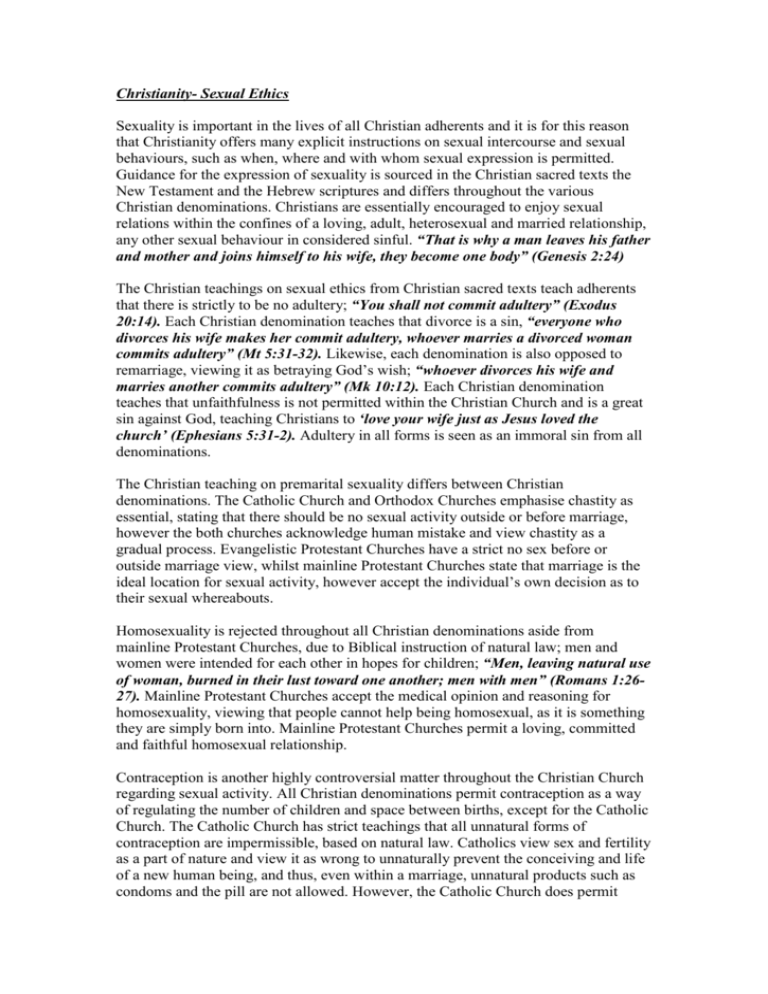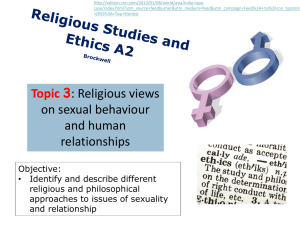
Christianity- Sexual Ethics
Sexuality is important in the lives of all Christian adherents and it is for this reason
that Christianity offers many explicit instructions on sexual intercourse and sexual
behaviours, such as when, where and with whom sexual expression is permitted.
Guidance for the expression of sexuality is sourced in the Christian sacred texts the
New Testament and the Hebrew scriptures and differs throughout the various
Christian denominations. Christians are essentially encouraged to enjoy sexual
relations within the confines of a loving, adult, heterosexual and married relationship,
any other sexual behaviour in considered sinful. “That is why a man leaves his father
and mother and joins himself to his wife, they become one body” (Genesis 2:24)
The Christian teachings on sexual ethics from Christian sacred texts teach adherents
that there is strictly to be no adultery; “You shall not commit adultery” (Exodus
20:14). Each Christian denomination teaches that divorce is a sin, “everyone who
divorces his wife makes her commit adultery, whoever marries a divorced woman
commits adultery” (Mt 5:31-32). Likewise, each denomination is also opposed to
remarriage, viewing it as betraying God’s wish; “whoever divorces his wife and
marries another commits adultery” (Mk 10:12). Each Christian denomination
teaches that unfaithfulness is not permitted within the Christian Church and is a great
sin against God, teaching Christians to ‘love your wife just as Jesus loved the
church’ (Ephesians 5:31-2). Adultery in all forms is seen as an immoral sin from all
denominations.
The Christian teaching on premarital sexuality differs between Christian
denominations. The Catholic Church and Orthodox Churches emphasise chastity as
essential, stating that there should be no sexual activity outside or before marriage,
however the both churches acknowledge human mistake and view chastity as a
gradual process. Evangelistic Protestant Churches have a strict no sex before or
outside marriage view, whilst mainline Protestant Churches state that marriage is the
ideal location for sexual activity, however accept the individual’s own decision as to
their sexual whereabouts.
Homosexuality is rejected throughout all Christian denominations aside from
mainline Protestant Churches, due to Biblical instruction of natural law; men and
women were intended for each other in hopes for children; “Men, leaving natural use
of woman, burned in their lust toward one another; men with men” (Romans 1:2627). Mainline Protestant Churches accept the medical opinion and reasoning for
homosexuality, viewing that people cannot help being homosexual, as it is something
they are simply born into. Mainline Protestant Churches permit a loving, committed
and faithful homosexual relationship.
Contraception is another highly controversial matter throughout the Christian Church
regarding sexual activity. All Christian denominations permit contraception as a way
of regulating the number of children and space between births, except for the Catholic
Church. The Catholic Church has strict teachings that all unnatural forms of
contraception are impermissible, based on natural law. Catholics view sex and fertility
as a part of nature and view it as wrong to unnaturally prevent the conceiving and life
of a new human being, and thus, even within a marriage, unnatural products such as
condoms and the pill are not allowed. However, the Catholic Church does permit
natural methods of birth control such as rhythm control and allows for unnatural
contraception to be used to treat sexual medical conditions only.
Each Christian denomination teaches that within a marriage, sexual intercourse should
be participated in for a healthy and enjoyable lifestyle for a loving and committed
couple; ‘two people become one flesh, so they are no longer two but one’ (Genesis
2:24). The Church teaches that sexual activity should always lead to new life and
hopes for children, otherwise it is viewed as selfish; ‘be fruitful and increase in
number’ (Genesis 1:28). Inside a marriage is seen by all denominations as the
desirable place for sex where children can be raised. God created sexual intercourse to
unite an individual with their partner in Holiness.









